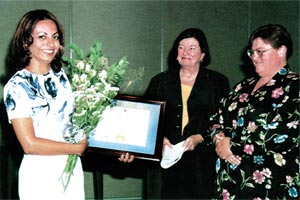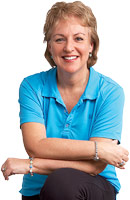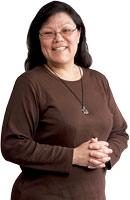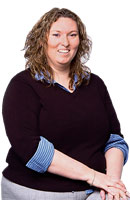The First Decade at the Ontario College of Teachers
10 Years
10 Teachers
Since May 20, 1997, the
College has certified more than 97,000 new teachers. Sometime in
2007, half of all College members will have entered the profession
through College certification.
In this article we take a look at what 10 members – one
from each year – are doing today. We'll start with the
first member certified by the College.
|
 |
“Be flexible and confident
and don't be afraid to think outside the box. Do what you think will
work best for your students.” |
1
|
|
Year
Luci Loisi
|
Luci Loisi was hired to do an LTO for the Dufferin-Peel Catholic DSB
in September 1997. And she's been there ever since, now the consummate
professional, 10 years into a long-term career.
Hired to teach French at Loyola CSS, Loisi's start was abruptly interrupted
by a political protest. Instead of standing in a classroom, she found
herself standing on a sidewalk carrying a placard.
The following year the teachers were back on the picket lines, this
time before the school year began. “That was a tough beginning,” she
says. She remembers questioning whether she should stay in teaching.
Happily, she did. She taught at Our Lady of Mount Carmel Secondary School
from December 1997 until June 2003, when she became part of the team
to open a new school in Dufferin-Peel: St. Marcellinus Secondary School.
She's been teaching French there ever since, and sees herself still there
in another 10 years.
Loisi says she was thrilled when that first group of Grade 9 students
graduated from Grade 12 this past June. “It's been fantastic being
part of a new school – hiring staff, developing policies and
influencing programs. I have enjoyed the challenges.”
In the early days she found it difficult to manage her own high demands
to be a perfectionist and ensure that every class was engaging, rigorous
and creative. “There was little time for anything other than work,
and it was stressful feeling I had to prepare something new and exciting
every day.”
 |
Luci Loisi was the first to receive her Certificate
of Registration from the new College. This photo, with the first
Registrar Margaret Wilson and first Chair Donna Marie Kennedy,
appeared in the September 1997 issue of Professionally Speaking.
|
Time and experience have taught her to manage her time and expectations
better. “I have a repertoire now. I have resources and activities
I know work. It's still demanding and can still be stressful, but not
like it was.”
Back then, Loisi was afraid to ask colleagues for help. She didn't want
to show weakness, especially in front of administration and more experienced
colleagues. It's different today.
She says, “I introduced Le Petit Prince to my Grade 12
students and had them colouring with crayons, and they loved it.” Ten
years ago she would never have done that for fear of what admin would
think. Today she realizes that such creativity is necessary to keep her
students engaged. Moreover, her strong professionalism and confidence
erase her worries about what others think.
Along the way, Loisi has completed AQs in Special Education, co-op and
religious education, as well as her Master of Education.
“It gets easier,” she promises, and she encourages teachers
who are struggling to stick with it. “When I had an especially
difficult class,” she remembers, “I sometimes felt like giving
up.” In hindsight, though, it was those classes that taught Loisi
the most about classroom management, discipline, organization and creativity. “I
had to work extra hard to engage some students, and it forced me to develop
alternative teaching styles, which made me a better teacher.”
 |
“Start by getting students
truly interested. It's important to build relationships with them
and to treat them with respect and civility, no matter what the circumstances.” |
2
|
|
Year
Carl Gagnon
|
This year Carl Gagnon worked with Manon Séguin, a singer from
L'Orignal in the Cornwall area, to prepare a school tour to show students
that it's possible to succeed and to work in French in the region. He
says, “The students saw that success is possible right here, and
that you don't necessarily have to go to Hollywood.”
Gagnon is a language planning teacher for the Conseil scolaire de district
catholique de l'Est ontarien, and works from an office in the école
secondaire catholique La Citadelle in Cornwall. His main duties relate
to the implementation of the aménagement linguistique policy,
which is intended to improve students' communication skills, increase
enrolment in French-language schools and support teachers in their activities.
One of Gagnon's greatest pleasures is watching young people's reaction
to the projects they undertake. “I like to see them smile,” he
says. “I like to see teachers happy and watch how the new activities
benefit so many students.”
Even though he is passionate about his new role, this former elementary
school French Immersion teacher admits that he misses the students. “I
work behind the scenes and my direct contact with them is limited. When
I visit the school or have the opportunity to work with and see my former
students again, we say hello. Human contact, smiles, joys, failures – all
these things explain my attachment to the profession and the fact that
I am still working in teaching today.”
His hobbies are baseball, soccer, fishing and spending time with his
family. He says: “You need to know when to say no. It's a great
challenge because my work is important, but I also need to spend time
with my wife and my little darlings to give them the love and attention
they need. My wife is a teacher, and several members of my family have
been in teaching, so the people around me are very understanding and
have set an example for me to follow.”
 |
“It's fantastic to spend time
talking with the children about their cultures and traditions. They
get so excited when they talk.” |
3
|
|
Year
Anju Bhardwaj
|
Every morning Anju Bhardwaj works for the Toronto DSB. Her daughter
was born in 2005 and she relishes her time both at school and at home,
especially after being on maternity leave.
Bhardwaj started with the TDSB in 1999, working at Rose Avenue JPS,
Nelson Mandela Park PS, Chine Drive PS, and now Glen Ravine JPS.
She has taught JK/SK and a Grade 4/5 split, and she prefers the JK/SK
students. “I enjoy the kids' energy, their enthusiasm and their
eagerness to learn.” She also likes the respect the smaller children
give their teachers, and feels she connects best with this age group.
She found it challenging to get back into the swing of things after
her maternity leave, more so because she came back to a new school and
new colleagues. “It took a while to adjust,” she admits, “but
everything is going well now.”
Reflecting on her career, Bhardwaj feels that one of her strengths comes
from the tremendous variety of students. “I've had many children
with high emotional and behavioural needs, and kids who don't speak English,
and I know how to work with them to help them be successful.”
One of her major challenges, although she doesn't see it that way, is
the fact that many of her JK students come to her class with little or
no English. “Parents whose first language is not English send their
children to school thinking, ‘This is where they will learn English.'”
Bhardwaj takes it in stride. “The kids pick up a lot from their
classmates and they follow the other kids. Plus, I repeat myself and
use visuals to reinforce what I am saying.” She also encourages
them to speak in complete sentences. “They quickly learn ‘washroom'
but they only say the word. I have them speak in full sentences to ask
for what they want.” Many of her students are Tamil and the students
will translate for each other too.
Bhardwaj herself learned English as her second language; Punjabi is
her first. “I did my schooling in Burlington and I acquired my
English skills without difficulty.”
 |
“Teaching is far more satisfying
than banking. It's about giving, not taking.” |
4
|
|
Year
David Douglass
|
“Having other careers before teaching has broadened and strengthened
my practice,” says David Douglass, who worked first in hospitality
and then in banking.
In 1999 he and his wife (now a nurse) decided to change career paths
to focus more on helping others. And he hasn't looked back.
Working in Sudbury for the Rainbow DSB, Douglass has taught in three
different schools, teaching Grades 6, 7 and 8, working as a Special Education
Resource Teacher (SERT) and teaching students in an autism spectrum disorder
class. He has been at Long Lake PS for the past two years.
The school has 83 students, five teachers and a shared principal, vice-principal
and SERT. The small school means a tight staff, a supportive community
and the luxury of getting to know all of the students. Douglass comments: “One
of the things that makes teaching most enjoyable for me is getting to
know my students both inside and outside the classroom.”
He likes teaching the 5/6 split because he has many students for two
years in a row. “It allows me to really understand and teach to
their learning styles, and to help them be as successful as possible.” That's
not always easy to do, especially with 28 kids in the class.
Douglass feels it's important to show his students that he cares about
them. “I let them know they are integral to the success of our
classroom, and that I and their classmates miss them when they're not
here. I take the time to listen to their stories and show them that I'm
interested in what interests them.”
He stresses the importance of learning to his students, and it's just
as important to him. He's started his MEd, and has his specialists in
reading and Special Education. Douglass has worked hard to integrate
and apply what he learned in his AQs to his programming.
He plans to keep on teaching, maybe at the university level once he
finishes his next degree, or perhaps with the lucky students at Long
Lake PS.
 |
“I'm addicted to this job,
and it's because of the kids.” |
5
|
|
Year
Irene Maccarone
|
Irene Maccarone is in her sixth year of teaching, all of it with Grades
4 and 5 students at Credit Valley PS in the Peel DSB. This year she's
teaching Grade 5 at the Erin Mills school.
She worked in IT in the banking and brokerage industries for several
years before becoming a teacher. “Business is demanding and challenging,
and teaching is even more so. There's never enough time, and time management
is my biggest challenge. I'm pulled in so many directions: students,
my program, clubs, teams, concerts, staff meetings, paperwork. My dream
job would be to have enough time to work with the kids all day long.”
Maccarone helps run the school's speech club. She coaches the cross-country
team and is involved in the school's and board's anti-bullying programs. “Kids
need to be made aware that bullying occurs everywhere,” she says. “They
need to learn what it is, how to avoid it, and what to do if they encounter
it.”
She believes that all children have something good in them and that
it's her challenge to bring it out. “Everyone can succeed and get
recognition from their peers for doing something well. It's my job to
figure out what that is for each child and to make it happen.”
She's getting ready for yet another AQ course – ESL Part 1 – and
is currently reading Getting Beyond “I Like the Book” on
teaching students critical reading and thinking skills.
Maccarone found her first couple of years extremely difficult, but is
happy that she stuck with it. “When I started, someone told me
it would take about five years to feel comfortable in my career and strike
the right life-work balance. I agree with that.”
Maccarone sees herself as continuing to work with students, although
maybe not in Canada. “There are so many opportunities out there
in the world and I want to take advantage of them. I may want to teach
abroad.”
 |
“It is an incredible experience
to watch their progress in reading and writing, to see them become
more independent.” |
6
|
|
Year
France Monette
|
France Monette teaches at école élémentaire catholique
Saint-Antoine in Tecumseh, near Windsor.
“As a Grade 1 teacher,” she says, “I'm the one
who needs to take some of the play out of things and establish routines,
give them structure, and show them how to work, manage their time and
do their homework. It's an incredible experience to watch their progress
in reading and writing, to see them become more independent and enjoy
what they have been able to accomplish after only a few months.”
Her greatest challenge is teaching a class in which more than half the
students do not speak a word of French. “Their mother tongue may
be English, Romanian, Arabic or Italian, and it's up to me to help them
make progress – to elicit their interest in the French language
and keep them interested, so they can develop fully within the French-language
school system.”
Monette applauds research and development in education technology and
the many different kinds of software that exist, but laments the lack
of time, and courses, to learn them all.
She would like to teach her students that they should take pride in
themselves as francophone Catholics. “It's important to live your
faith, your Catholic religion and your Frenchness in a visible way everywhere – in
the school and the community and not only in the classroom. We need to
be proud of being francophone, proud of who we are.”
In her free time, Monette likes to read about education and she occasionally
writes poetry. But, she adds, “I have three daughters. I am therefore
both a mother and a taxi driver.
“I'm lucky to have a good husband. He's a high school teacher.
I often tease him by telling him that I have more work than he has, but
he answers back that the very opposite is the case!”
 |
“Prepare for the worst, but
expect the best.” |
7
|
|
Year
Lenora Maracle
|
Making a difference is what teaching is all about for Lenora Maracle,
a Mohawk Language teacher from Six Nations of the Grand River near Brantford.
For some of her students, her class is their first introduction to their
own language.
After graduating from Seneca College, Maracle worked for 10 years as
an audio-visual technician with the York School Board. She returned to
Six Nations once she had her children. She worked as a bus driver, in
a ladder factory and in a bakery before taking the Native Teacher Education
program on Six Nations. She then began teaching in elementary schools
there, but to teach high school in the Grand Erie DSB she needed certification.
She attended the Aboriginal Teacher Certificate Program at Nipissing
University in North Bay to earn her certificate. Since then she's been
teaching Mohawk in high school from September to February, then supply
teaching in the five elementary schools on the reserve for the rest of
the year.
The native languages curriculum document is very vague, she explains,
because it has to handle so many different languages. “As language
teachers we have to develop our own resources and teaching tools. You
can't find them on the Internet or in bookstores. Each teacher develops
his or her own, and the styles of teaching differ.” Maracle has
adapted some of her course materials from those used in the adult immersion
program. Others she found in a kindergarten class when supply teaching.
Maracle finds herself incorporating more traditional skills in her classroom.
As an aboriginal clothing and crafts artisan, trained at Pine Tree Native
Centre in Brantford, she finds that crafts can make a difference in her
students' sense of accomplishment and pride. A student having difficulty
with the language class was transformed by an opportunity to make his
own moccasins.
Maracle has noticed a decline in respect for teachers in her few years
in the profession. For many students, the initial excitement about learning
Mohawk has worn off, and they now take learning their language for granted.
She credits parental and family involvement for those who are succeeding. “If
the parents think the language is important, then the kids do too,” she
maintains. Maracle's personal motto is: “Prepare for the worst,
but expect the best,” and although she would prefer to teach her
language in high school all year round, she brings her unique and multi-faceted
cultural approach to her elementary teaching as well. And that makes
a difference to all her students.
 |
“Every day there's something
new; it's never the same old thing.” |
8
|
|
Year
Amanda Flemming
|
Amanda Flemming is enthusiastic about her new profession. “You
go to university for five years to prepare for something you think you
want to do, but you don't know for sure until you're done and out there.
I can honestly say that I love it!” And it's the variety and the
students she enjoys most.
Flemming has been teaching math and English at J. Clarke Richardson
Collegiate in Ajax in the Durham DSB since she joined the College. Her
timetable has alternated between one semester of applied math and one
of academic English, mostly with students in Grades 9 and 10. She also
teaches Grade 12 University English at night school.
Flemming especially enjoys working with students at the applied level. “Most
academic kids are good, hard-working and know what they want and how
to achieve it. At the applied level, many students have struggled in
school and it doesn't come easy.” She enjoys the challenge of finding
success with them. “I may not see progress every day with these
kids, but I do over time, and that makes it worthwhile.”
She strives to find a balance between lesson planning and marking. Her
dream would be to make every lesson fun, engaging and applicable to her
students' lives, but she's come to realize that isn't possible, at least
not every day. She wants to spend her time prepping, but there's also
marking and administrative work to be done. Finding the right balance
comes from discipline and time management, she feels. “I try to
use my prep period for lesson planning, and then mark and do paperwork
after school.”
J. Clarke Richardson Collegiate has a strong technology focus. Flemming
and all her colleagues have laptops and access to smart boards, data
projectors and the Internet. She uses IT regularly and her students work
in the computer lab at least once a unit. In English, her biggest challenge
is teaching students to research responsibly and filter what they find
on the Net.
This relatively new teacher has some advice for newer teachers: “Don't
take yourself too seriously; your students won't. Remember why you went
into teaching – to work with kids. Don't sweat the small stuff.
Have fun!”
 |
“There are not a whole lot
of things more important on this planet than working with kids.” |
9
|
|
Year
Karen Heffernan
|
New teachers are typically full of high ideals and brimming with the
vision of teaching that brought them into the profession – then
they have to face the real world.
Karen Heffernan has been able to integrate her ideals into the reality
of her first job. In only her second year of teaching, she is assistant
head of English at Clarington Central Secondary School in the Kawartha
Pine Ridge DSB. “I was in the right place at the right time with
the right list of accomplishments,” she says. Clarington is a brand
new school. From before the ground was broken, the principal and staff
have been working together to make decisions that best meet the needs
of students.
“Our school recognizes the gifts of all students,” she maintains.
Her classroom is currently home to two different groups of learners:
Grade 9 and Grade 12. “Both sets of kids have a lot to change in
their world. They see things in unique ways. Coming to the same classroom
they see each other's work displayed and ask questions, learn from each
other.”
This integrative approach to learning offers many rewards, but Heffernan
says her greatest challenge is what she sees as the disconnect between
the goals and philosophy of teaching supported by her school, and the
big push for numbers from the province. In her opinion, “The kids
we're trying to help are punished by the numbers-driven system.” She
still believes that accountability is important, “but I'm also
personally accountable, and I'm accountable to the people in my room.”
Before becoming a teacher, Heffernan was an adult literacy worker with
Frontier College in Peterborough, and she worked with the disability
services office while in the concurrent education program at Trent.
She finds that the learning community model in her school allows for
mentors to grow with her. She has embraced the recent technological advances
that her school has incorporated. Announcements are televised, there
are high levels of access to computer labs, and she is eager to explain
that “learning through video conferencing helps students realize
how big the world is and how many new skills they'll need, regardless
of their career path.”
 |
“That's my passion. I am a
teacher.” |
10
|
|
Year
Chukwuyem Imahiagbe
|
Recently certified to teach in Ontario, Chukwuyem Imahiagbe is searching
for a new job that follows his passion – teaching.
Imahiagbe grew up in Nigeria, where he graduated from the University
of Ibadan and teacher's college and taught math for two years. Then he
moved to England. While working on his masters in computing and information
systems at the University of Luton, he taught math and information technology
to 16- to 19-year-olds at Luton Sixth Form College for 18 months. He
also coached the school chess team.
Imahiagbe came to Canada in 2005, thinking he would have to take an
examination to qualify to teach here.
“I got myself connected with Teach in Ontario,” he says. “There,
I got information that was very useful and important. They provide information
on schools, boards, curriculum, how to get on the supply list, how to
have a chance to get employed. I didn't need to take any more exams,
I just had to submit my application and get documents from Nigeria and
England.”
One important factor was visiting Ontario classrooms. Imahiagbe found
that helpful, although he says, “From what I'm used to in England,
what I saw here is about the same.”
One difference he found was that desks in Ontario classrooms were arranged
so that students sat alone. In England, they were arranged in pairs.
But, he noted, there was enough room here for students to interact. “The
teachers I observed created a stimulating environment with time for students
to work together. They encouraged team work and collaboration.”
Just before the 14-week Teach in Ontario program ended, Imahiagbe took
a position with Dell Canada. As a quality specialist, he listens to calls,
provides feedback on the quality of the call, and coaches agents on how
to improve.
Imahiagbe's next step, now that he is licensed to teach in Ontario,
is to get acquainted with the school boards in Ottawa, where he and his
family live. “I'll be happy to move back to the public school system
where my training and experience will be put to use. I'm looking to teach
science, math or computers.”
Imahiagbe fully intends to find himself a place in a classroom – and
also to coach the school chess team, or form a chess team if need be.
|


